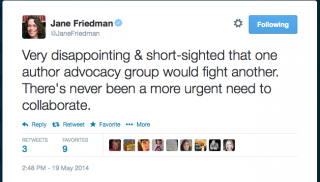May 20, 2014
Authors Alliance launches, to the chagrin of the Authors Guild
by Kirsten Reach
 Tomorrow’s launch of a new organization called the Authors Alliance—founded by Berkeley academics interested in providing support for authors interested in sharing their content for free—is causing some disruption at the Authors Guild, an advocacy group for published writers. Founded in 1912, the Authors Guild is focused on copyright and fair contract terms, and some members had a strong reaction to the idea that a competing organization might draw its members away or tempt them to give their work away for free.
Tomorrow’s launch of a new organization called the Authors Alliance—founded by Berkeley academics interested in providing support for authors interested in sharing their content for free—is causing some disruption at the Authors Guild, an advocacy group for published writers. Founded in 1912, the Authors Guild is focused on copyright and fair contract terms, and some members had a strong reaction to the idea that a competing organization might draw its members away or tempt them to give their work away for free.
Both organizations are supposed to be advocating for authors, right? So you think they’d find some way to work together for free speech, copyright protection, and favorable contract terms?
Pamela Samuelson is one of four academics at Berkeley who helped to launch the Authors Alliance. She has a legal background, working with copyright protections for authors and restricting remedies for infringement. Another co-founder is Molly van Houweling who, unsurprisingly, helped to found Creative Commons. The organization is for content creators “who are interested in making their works available on a widespread, no cost basis.”
In an interview with Publishers Weekly, Samuelson said, “We think the big uptick in the use of Creative Commons licenses is a sign that it is not just academics that want to make things widely available for the purpose of promoting knowledge and culture; however, we understand that the first audience that is likely to find our mission appealing will be academic authors.”
“I would like to pass along a warning about a new group that is trying hard to attract members,” begins an open letter from T.J. Stiles of the San Francisco Writers’ Grotto to the Authors Guild. Stiles describes the Authors Alliance as a “counterweight to the Authors Guild.” The Alliance opposes some of the Guild’s hardest-fought battles, including the lawsuit against Google Books.
Stiles begs members of the Authors Guild not to jump ship:
If any of you earn a living as a writer, or hope to, I strongly urge you not to join the Authors Alliance. If you think authors should be the ones to decide what is done with their books, then I strongly urge you not to join.
However, if you are an academic, or scorn the idea of making a living from writing as a quest for “fame and fortune,” the Authors Alliance may be the organization for you. If you think, in our digital age, that the biggest problem facing authors is how hard it is to give your work away for free, it’s for you. If you think you’ve got too much power over people who copy and distribute your work without your permission, by all means sign up. Even if you agree with one or two things advocated by the Authors Alliance, if you join you lend weight to its entire agenda.
The Authors Guild may be right to be concerned about authors undervaluing their work, or turning against the copyright law the organization has worked hard to protect. But this isn’t a great time to post angry open letters on the Guild’s website.
The Authors Guild have been vocal about the Hachette-Amazon dispute that began last week, and if they continued to focus their attention on the retailer, we might make some headway. Hachette authors and their supporters have attracted some media attention about the effects of Amazon’s extortionary tactics, including a David Streitfeld piece in the New York Times.
Yesterday Jane Friedman, web editor of the Virginia Quarterly Review, shared her thoughts on Twitter:
 Here’s hoping the Authors Guild can talk with the Authors Alliance to find some middle ground. We could use some articulate, well-read people to get back to talking about the most pressing issues in our industry.
Here’s hoping the Authors Guild can talk with the Authors Alliance to find some middle ground. We could use some articulate, well-read people to get back to talking about the most pressing issues in our industry.
Kirsten Reach is an editor at Melville House.